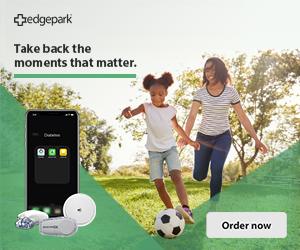Preparing for your first endocrinologist appointment
So, you've made your first endocrinologist appointment as a patient with type 1 diabetes (t1d). Congratulations! This is a big step in your journey. You may be feeling a little overwhelmed, nervous or intimidated, but don't worry — you're not the first person to find themselves in this position, and you're already on the right track just by reading this article.
Living with a condition as complicated and dynamic as t1d can be tough. Regular endocrinologist appointments are an integral part of successful diabetes management. It's important to keep this in mind when planning for your first visit. I view my quarterly endocrinologist appointments as valuable sync points along my own t1d journey.
As your first appointment approaches, know that careful and thorough preparation will lay the foundation of your doctor-patient relationship. Here are some helpful approaches you can use to show your endocrinologist that you are invested in your own care.
Determine goals
First things first — each and every endocrinologist visit should be a two-way conversation. I find the best way to engage, be heard and receive pertinent information is by doing some prep work.
A few weeks before my scheduled appointment, I take some time to write down a few near-term diabetes goals for myself. This could be anything from quantitative statements such as "I would like to get my time-in-range to 65%" to more qualitative statements such as "I want to feel comfortable eating out and estimating carbohydrate counts."
Over time, your goals may shift, which is perfectly normal. For instance, now that I'm a busy mom of two, my goals are geared toward fine-tuning my diabetes technology. I like to discuss insulin pump settings and new features when meeting with my endocrinologist.
Since it's your first visit, it's also a good idea to consider the goals you have for this new relationship. Think about how often you want feedback, what your expectations for the doctor are and the depth of understanding you want to establish. If possible, print off reports of blood sugars or settings for your insulin pump for your visit with your doctor, so it can be reviewed. Heading into your first meeting with this insight can help guide the discussion and ensure you and your endocrinologist are on the same page.
Understand your health insurance coverage
Managing T1D requires many prescriptions. If you haven't looked into that portion of your health insurance coverage recently, calling the provider before your appointment can help you understand options for ordering (and paying for) medicine and medical supplies.
Make sure to find out the pharmacies your insurance company works with, especially if you need to locate a medical supply company. Some insurance companies prefer patients to request a one-month supply of refills and others prefer patients to request a three-month supply, so it's important to inquire.
You should also ask about the types of diabetes devices, such as continuous glucose monitors (CGMs) and insulin pumps that are covered and at what cost to you. Knowing this information before showing up at the doctor's office will help streamline the (inevitable) conversation around prescriptions!
Be open and honest with your doctor
When preparing for your first endocrinologist appointment, make a list of questions and discussion topics you would like to address with your doctor. Creating a physical (or digital) list helps me collect my thoughts and focus the conversation on the topics I really want to tackle during the visit. Your doctor will likely appreciate how prepared you are as well.
Some items to consider discussing include:
- Your diabetes goals and how to reach them. Consider setting intermediate goals to hit by your next visit.
- What is working for you and what is not. Be straightforward. Your endocrinologist is there to help you, so they need your honest input. Ask for additional specialist-level help if needed, such as seeing a dietitian.
- Adding diabetes technology to your toolbox. Your endocrinologist appointment is a great opportunity to see a demo unit or ask about the pros and cons of individual products. If you want to squeeze more use out of the technology you already have, ask your doctor for specific tips or tricks that other patients in the office have shared.
- Use of telehealth visits or sending in blood sugar data from a CGM to get feedback between visits. This can be especially helpful if you are new to the disease or establishing new management goals.
- Reviewing your prescription list to make sure it includes insulin, an insulin pump and CGM supplies as well as backup supplies like insulin pens and needles, glucagon kits, keto strips and test strips.
Remember you're in this together
The relationship you build with your endocrinologist is symbiotic and will thrive only when both parties are fully engaged. You are a huge part of the doctor-patient team, arguably the most important part.
Managing t1d means having to navigate an array of parameters — tracking A1C, time-in-range, blood sugar readings, insulin dosing and many other variables — so it may feel like you're being put on trial when reviewing your numbers with a doctor. This is common, but know that you're not being judged!
You're more than your t1d numbers, and you deserve to be reminded of that regularly. Routinely attending appointments and actively engaging with your endocrinologist team is a huge part of self-care and self-love. Go ahead and treat yourself!
Hungry for more information about living with diabetes? Explore the many resources and insights available on the Edgepark website.




